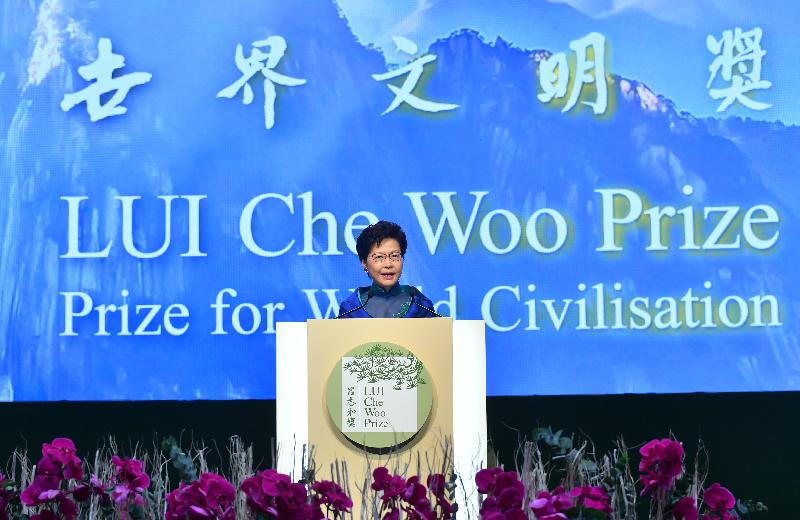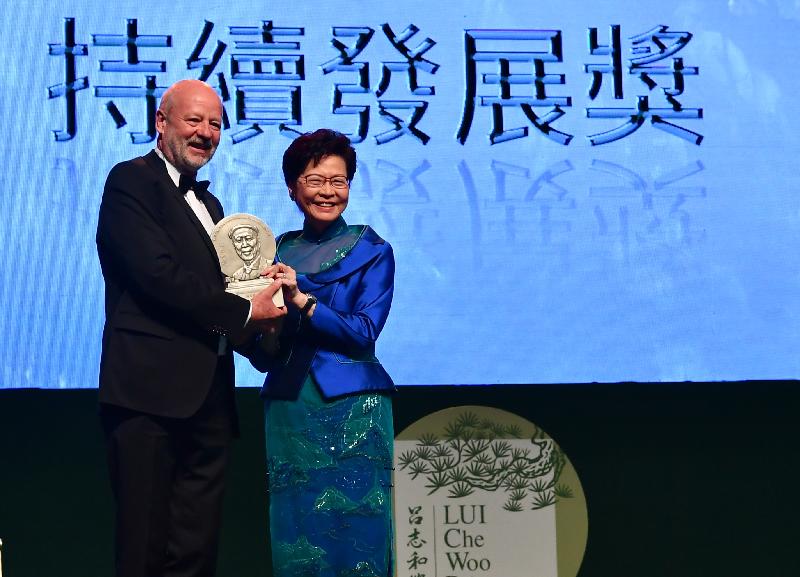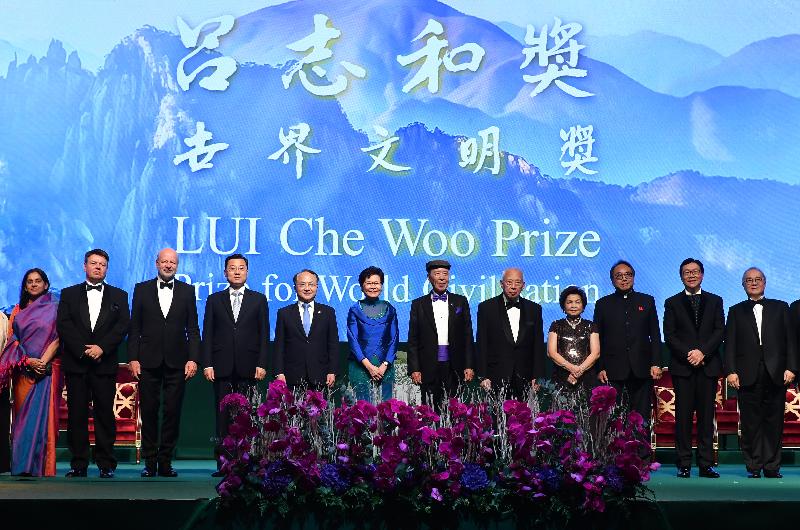Speech by CE at Lui Che Woo Prize - Prize for World Civilisation Prize Presentation Ceremony (English only) (with photos/video)
******************************************************************************************
Mr Tung (Vice Chairman of the National Committee of the Chinese People's Political Consultative Conference, Mr Tung Chee Hwa), Director Wang (Director of the Liaison Office of the Central People's Government in the Hong Kong Special Administrative Region (HKSAR), Mr Wang Zhimin), Commissioner Xie (Commissioner of the Ministry of Foreign Affairs of the People's Republic of China in the HKSAR, Mr Xie Feng), Dr Lui (Founder and Chairman of the Board of Governors cum Prize Council of the Lui Che Woo Prize, Dr Lui Che-woo), distinguished recipients of the Lui Che Woo Prize, guests, ladies and gentlemen,
Good evening. It's an honour to join you tonight for the presentation of this year's Lui Che Woo Prize - Prize for World Civilisation.
First and foremost, allow me to extend my congratulations to this year's awardees: the Pratham Education Foundation, for the Positive Energy Prize; the World Meteorological Organization, for the Welfare Betterment Prize; and Mr Hans-Josef Fell, recipient of the Sustainability Prize. Their singular contributions to the elimination of illiteracy, the reduction of the impact of natural disasters, and the development of renewable energy respectively, match perfectly the laudable mission of the Lui Che Woo Prize. Now into its third year, the Prize should take pride in creating recognition for efforts in building a better, more harmonious world, and in making a difference today, tomorrow and deep into the future we all aspire to. And the Hong Kong Special Administrative Region is proud to have this home-grown international prize built on Dr Lui's vision and generosity.
Allow me to say a few words about each of this year's awardees and how it resonates with my vision for Hong Kong. First is the Pratham Education Foundation, recipient of the Positive Energy Prize. Established in 1995 to provide education to children in the slums of Mumbai, Pratham has grown over the years, and is now one of the largest non-governmental organisations in the country of India. Pratham focuses on high-quality, low-cost, and replicable interventions to address gaps in the education system in India, and it has reached millions of children living in both rural and urban areas through a range of interventions across the country. These include pre-school education, a variety of learning support initiatives for elementary school as well as vocational training for youth. While Pratham's focus is in India, its impact has gone beyond the country, for its success has encouraged other developing countries in Asia, Africa and America to replicate the model, benefiting even more children.
I am heartened to read about Pratham's achievements. While the challenges in education faced by India and Hong Kong are considerably different, I believe that my Government and Pratham share the same belief, that education is the most meaningful investment for our future. That is why my Government has spared no time in allocating additional resources for education in consultation with school and teacher organisations since I took office last July. In our 2018-19 financial year, total government expenditure on education is projected to reach a historic high of HK$113 billion, an increase of 28 per cent over the previous year and accounting for one-fifth of Hong Kong's total government expenditure. We are providing 12 years of free education at the primary and secondary levels and more recently, we have introduced free quality kindergarten education as well. For higher education, apart from a heavily subsidised university and vocational education system, we provide grants and loans, and more recently a HK$30,000 per year subsidy for students enrolling in self-financing institutions to provide multiple pathways for secondary school leavers.
But quality education is not just about money. We need passionate teachers who will impress and inspire, comprehensive and stimulating curriculum and sound parent-teacher co-operation. These are some of the subjects now being examined by professional-led task forces who will in due course advise the Government on what more to be done.
This year's Welfare Betterment Prize is won by the World Meteorological Organization (WMO). As a specialised agency of the United Nations with 191 Member States and Territories, WMO is the authoritative voice on the state and behaviour of the Earth's atmosphere, its interaction with the land and oceans, the weather and climate it produces and the resulting distribution of water resources. It plays a powerful role in contributing to the safety and welfare of humanity by providing vital weather and climate information worldwide and issuing early and reliable warnings of high-impact weather. Such information and warnings enable governments and people to not only take short-term precautionary measures against inclement weather, but also make long-term planning for the mitigation of and adaptation to global climate change.
I am proud that Hong Kong has been contributing to the work of the WMO, for Hong Kong, China has been a member to the Organization since December 1948. Our current permanent representative to the Organization and the Director of the Hong Kong Observatory, Mr Shun Chi-ming, was the first Asian to be the President of the Organization's Commission for Aeronautical Meteorology. His presidency ended earlier this year after eight years of remarkable service.
Last month, Typhoon Mangkhut brutalised a wide swath of Southeast Asia, including Hong Kong. The Hong Kong Observatory called Mangkhut the most powerful storm to hit Hong Kong since records began in 1946. Record-breaking wind speed and storm surge inevitably caused injuries to a few hundred people and brought some damages, including uprooting tens of thousands of trees, smashing hundreds of windows and damaging some of our facilities such as our sewage treatment plants. However, overall speaking, we have managed to keep the impact of Mangkhut on Hong Kong to a minimum, and the city has pretty much resumed normal by now.
Our success in minimising the impact of the super typhoon is down to the vigilance of relevant government departments and organisations which mobilised the manpower and resources to put in place the necessary precautionary measures. Members of the public in general have also made good preparations in anticipation of the typhoon. However, all these measures and preparation could not have been taken timely without the early warnings issued by the Hong Kong Observatory on the typhoon. This very much underlines the importance of weather information in saving lives and property.
Hong Kong, and the world at large, needs all the expertise we can get in responding to increasingly frequent extreme weather events. I know that we can continue to count on the World Meteorological Organization, and I applaud the Lui Che Woo Prize's vision in awarding its Welfare Betterment Prize to the Organization.
I'm delighted that this year's Sustainability Prize has gone to Mr Hans-Josef Fell, a renewable energy pioneer. In particular, during his time as a member of the German parliament, Mr Fell authored the draft Renewable Energy Sources Act, which was adopted in 2000 amid strong political opposition, turning Germany into the world's first major renewable energy economy. Building on his success, he has been sharing best practices and negotiating with governments and parliaments worldwide to accelerate the global transition to 100 per cent renewable energy, extending his impact to the global level.
While Hong Kong lacks the conditions for large-scale, renewable energy generation on a commercial scale, we are doing all we can to encourage it. Last year, we entered into new Scheme of Control Agreements with our the two power companies, which are the greenest ever and offer key features on promoting energy efficiency and conservation as well as renewable energy. In particular, Feed-in Tariff and Renewable Energy Certificates are two important new initiatives. Feed-in Tariff will help encourage the private sector to consider investing in renewable energy as the power generated could be sold to the power companies at a rate higher than the normal electricity tariff rate. As for the Renewable Energy Certificates, they will be sold by the power companies to their clients for units of electricity from renewable sources, allowing the community to show its support for renewable energy. These initiatives will be progressively implemented starting this month.
We have also proposed to introduce tax incentives for the use of energy-efficient building installations. Subject to the approval of the legislature, starting from the 2018-19 financial year, the capital expenditure on these installations can be fully deducted in the first year of purchase. In addition, the Government will reinforce its drive to install renewable energy installations at government buildings, venues and community facilities. The relevant funding reserved will be increased from HK$200 million to HK$1 billion for application by government bureaux and departments. Upon completion of all renewable energy projects, the total annual electricity generated is estimated to be over 6 million kilowatt-hours. We are also exploring the use of large-scale floating solar farms over our reservoirs.
Admittedly, we are still some way from the 100 per cent renewable energy goal championed by Mr Fell, but please be assured that my Government will press ahead with such efforts.
I once again congratulate the outstanding awardees of this year's Lui Che Woo Prize. I would also like to take this opportunity to commend Dr Lui for his vision in setting up this Prize. The Prize and its many illustrious past, present and future awardees will no doubt help show us the way to a brighter as well as more inclusive and caring future.
On that note, I wish you all an enjoyable evening. Thank you very much.
Ends/Wednesday, October 3, 2018
Issued at HKT 21:45
Issued at HKT 21:45
NNNN
Photo
Audio / Video
CE attends Lui Che Woo Prize - Prize for World Civilisation Prize Presentation Ceremony





